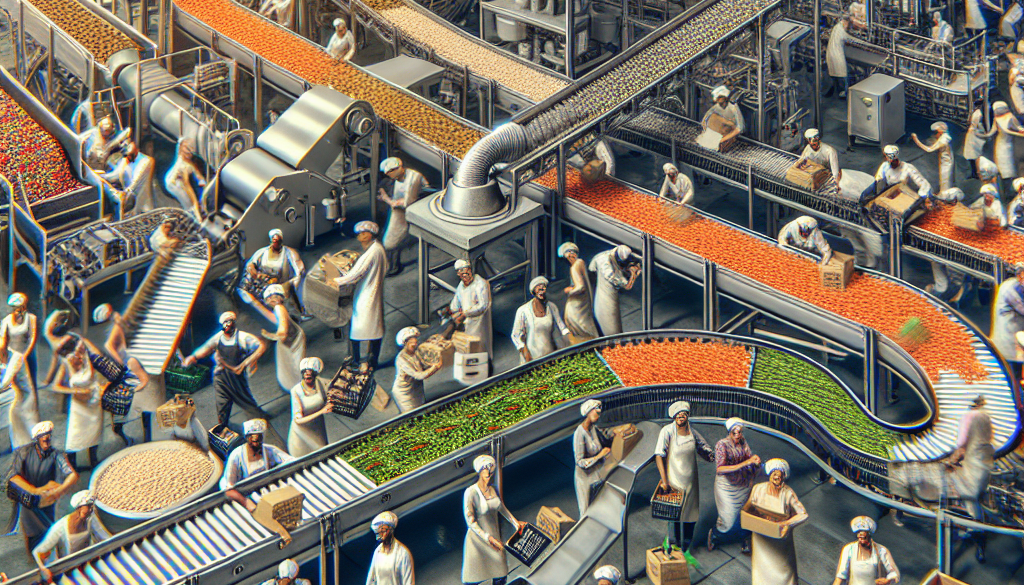Consumer Demand Has Become The Reason For Increasing Challenges For Food Processors.
-
Table of Contents
Consumer Demand Drives Food Processing Challenges
The food processing industry is a critical component of the global economy, providing consumers with a wide array of products that are convenient, safe, and nutritious. However, as consumer demand evolves, food processors are facing an increasing number of challenges. These challenges stem from a variety of factors, including changing consumer preferences, technological advancements, and the need for sustainable practices. In this article, we will explore the reasons behind these challenges and how they are shaping the future of food processing.
Shifts in Consumer Preferences
One of the primary drivers of change in the food processing industry is the shift in consumer preferences. Today’s consumers are more informed and have higher expectations regarding the quality, origin, and nutritional value of their food. Here are some key trends:
- Health and Wellness: Consumers are increasingly seeking foods that support a healthy lifestyle. This includes a demand for products with reduced sugar, salt, and fat, as well as an increase in plant-based and protein-rich options.
- Transparency: There is a growing desire for transparency in food sourcing and production. Consumers want to know where their food comes from and how it is made.
- Convenience: Busy lifestyles have led to a higher demand for convenient food options, such as ready-to-eat meals and snacks that do not compromise on quality or nutritional value.
- Ethical Production: Ethical considerations, such as animal welfare, fair trade, and labor practices, are becoming more important to consumers.
Technological Advancements
Technological advancements are both a boon and a challenge for food processors. While new technologies can lead to more efficient production and better quality products, they also require significant investment. Food processors must keep up with the following:
- Automation: Automation can increase efficiency and reduce labor costs, but it requires substantial capital investment and can lead to workforce displacement.
- Food Safety: Advanced technologies for food safety and traceability are becoming essential as consumers and regulators demand higher standards.
- Preservation Techniques: Innovations in food preservation, such as high-pressure processing (HPP), can extend shelf life without the use of preservatives, but they can be costly to implement.
Sustainability Challenges
Sustainability is another significant concern for food processors. Consumers are increasingly aware of the environmental impact of their food choices and are demanding more sustainable practices. This includes:
- Reducing Waste: Food processors are under pressure to reduce food waste throughout the supply chain, from production to packaging.
- Energy Efficiency: There is a push for more energy-efficient operations to reduce the carbon footprint of food processing facilities.
- Sustainable Sourcing: The demand for sustainably sourced ingredients is growing, which can be more expensive and difficult to secure in large quantities.
Regulatory Pressures
Regulatory pressures also contribute to the challenges faced by food processors. Governments around the world are implementing stricter regulations on food safety, labeling, and environmental impact. Compliance with these regulations can be complex and costly, requiring processors to invest in new technologies and practices.
Global Market Dynamics
The global nature of the food supply chain presents its own set of challenges. Food processors must navigate international trade agreements, currency fluctuations, and geopolitical events that can disrupt supply chains and affect the availability and cost of raw materials.
Adapting to Change
To meet these challenges, food processors are adopting various strategies, such as:
- Innovation: Developing new products and processes that align with consumer demands and regulatory requirements.
- Collaboration: Working with suppliers, distributors, and other stakeholders to improve sustainability and traceability.
- Investment: Investing in new technologies and facilities to increase efficiency and reduce environmental impact.
- Education: Educating consumers about the efforts being made to address their concerns and the benefits of new food processing methods.
Conclusion
In conclusion, the increasing challenges for food processors stem from a complex interplay of consumer demand, technological advancements, sustainability concerns, regulatory pressures, and global market dynamics. To remain competitive and meet these challenges, food processors must be agile, innovative, and willing to invest in the future. By doing so, they can ensure that they continue to provide consumers with the safe, nutritious, and high-quality food products they demand.
ETprotein’s Protein Products
In response to the growing consumer demand for plant-based and protein-rich options, ETprotein offers a range of high-quality protein products that cater to the needs of food processors. Their organic bulk vegan proteins and L-(+)-Ergothioneine are ideal for companies looking to expand their product offerings with ingredients that are non-GMO, allergen-free, and have a neutral taste. ETprotein’s commitment to quality and sustainability makes them a valuable partner for food processors facing the challenges of today’s market.
About ETprotein:
ETprotein, a reputable protein and L-(+)-Ergothioneine (EGT) Chinese factory manufacturer and supplier, is renowned for producing, stocking, exporting, and delivering the highest quality organic bulk vegan proteins and L-(+)-Ergothioneine. They include Organic rice protein, clear rice protein, pea protein, clear pea protein, watermelon seed protein, pumpkin seed protein, sunflower seed protein, mung bean protein, peanut protein, and L-(+)-Ergothioneine EGT Pharmaceutical grade, L-(+)-Ergothioneine EGT food grade, L-(+)-Ergothioneine EGT cosmetic grade, L-(+)-Ergothioneine EGT reference grade and L-(+)-Ergothioneine EGT standard. Their offerings, characterized by a neutral taste, non-GMO, allergen-free attributes, with L-(+)-Ergothioneine purity over 98%, 99%, cater to a diverse range of industries. They serve nutraceutical, pharmaceutical, cosmeceutical, veterinary, as well as food and beverage finished product distributors, traders, and manufacturers across Europe, USA, Canada, Australia, Thailand, Japan, Korea, Brazil, and Chile, among others.
ETprotein specialization includes exporting and delivering tailor-made protein powder and finished nutritional supplements. Their extensive product range covers sectors like Food and Beverage, Sports Nutrition, Weight Management, Dietary Supplements, Health and Wellness Products, and Infant Formula, ensuring comprehensive solutions to meet all your protein needs.
As a trusted company by leading global food and beverage brands and Fortune 500 companies, ETprotein reinforces China’s reputation in the global arena. For more information or to sample their products, please contact them and email sales(at)ETprotein.com today.












